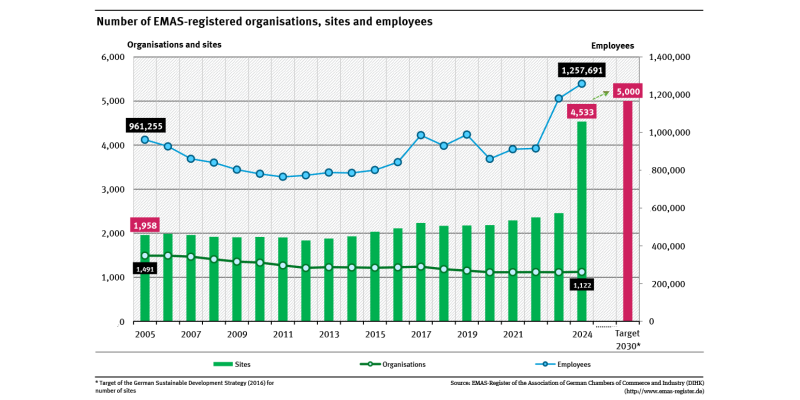Indicator: Environmental management
 Click to enlarge
Click to enlargeSource: EMAS-Register Figure as PDF
 Umweltbundesamt
Umweltbundesamt
 Click to enlarge
Click to enlarge
- EMAS is an internationally applicable system for environmental management. It is the most ambitious environmental management standard publicly available.
- In its sustainability strategy, the German government has set the target that 5,000 sites should be registered according to EMAS by 2030.
- In 2024, there were 4,533 sites with around 1.2 million employees.
The number of organisations and sites registered with the Eco-Management and Audit Scheme (EMAS) and employees in EMAS-registered organisations are a measure for the acceptance of sustainable production patterns in the economy. EMAS is applicable for companies and other organisations that want to improve their environmental performance in a systematic, transparent and credible manner. The scheme’s requirements are defined in the European EMAS regulation (EC regulation 1221/2009).
EMAS focuses on the environmental aspects of activities, products and services of organizations over the entire life cycle. These must be taken into account when defining and implementing processes, responsibilities and decision structures so that negative effects on the environment are continuously reduced. Progress is monitored by independent, accredited experts and reported in publicly accessible environment statements.
EMAS improves environmental protection and helps to save costs. An increased number of organisations joining the EMAS scheme will have an overall positive effect on environment, climate and resource protection. EMAS builds on the internationally widely used environmental management standard ISO 14001, but is more ambitious.
After a fluctuating development between 2005 and 2020, the number of organizations has been trending upwards since 2020. In 2024, there was a sharp increase due to the registration of all sites of a major German food retailer. The number of employees at EMAS-registered sites increased to around 1,250,000. In December 2024 1,122 organizations at 4,533 sites in Germany were EMAS-registered.
In the German Sustainable Development Strategy, the German Federal Government commits to further supporting EMAS (BReg 2016). In 2030, 5,000 sites should be EMAS-validated and registered. However, EMAS still needs more support to achieve and maintain this goal. So far, companies that are EMAS-registered have advantages in energy, water, waste and pollution prevention and control legislation and can benefit from various exemptions.
EMAS organisations and sites are registered by the competent Chambers of Industry and Commerce and Chambers of Handicrafts and enter the publicly accessible database of the Association of German Chambers of Commerce and Industry database. Data based on a unified collection method are available from 2005 onwards. The office of the German EMAS Advisory Board publishes a monthly summary of developments, based on relevant DIHK statistics.
More detailed information: 'Umwelt- und Energiemanagementsysteme' (in German only).